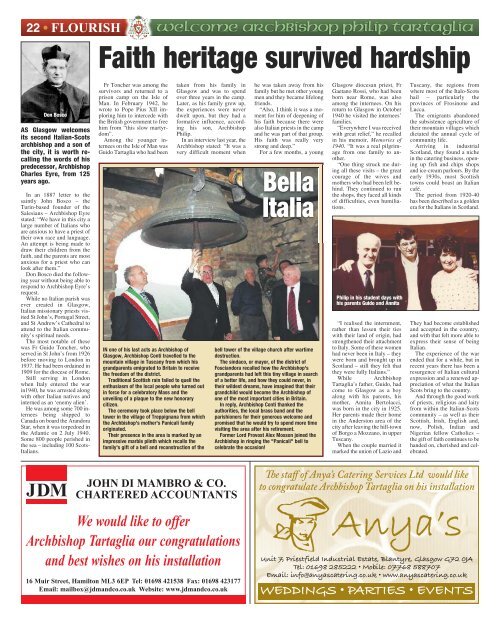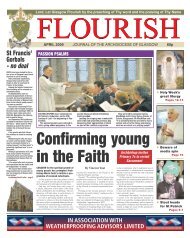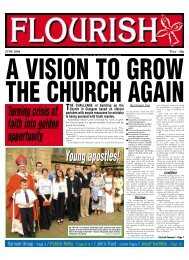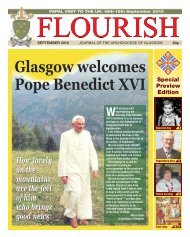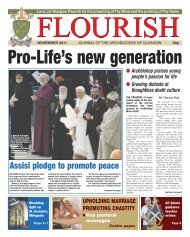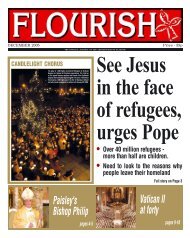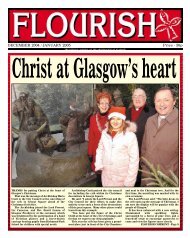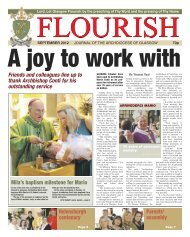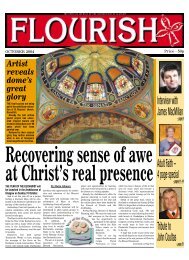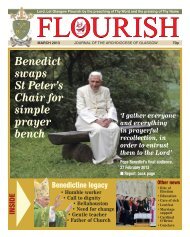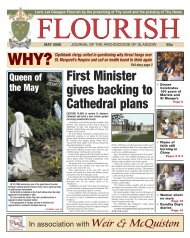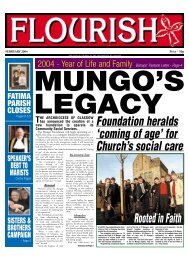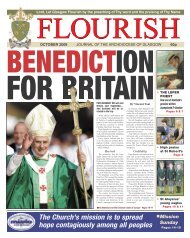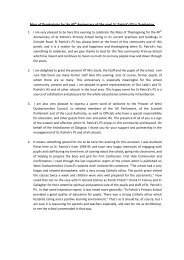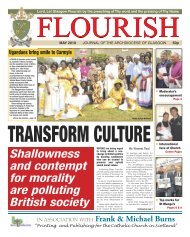October 2012 - Archdiocese of Glasgow
October 2012 - Archdiocese of Glasgow
October 2012 - Archdiocese of Glasgow
Create successful ePaper yourself
Turn your PDF publications into a flip-book with our unique Google optimized e-Paper software.
22 • FLOURISH<br />
WELCOME ARCHBISHOP PHILIP TARTAGLIA<br />
Faith heritage survived hardship<br />
Don Bosco<br />
AS <strong>Glasgow</strong> welcomes<br />
its second Italian-Scots<br />
archbishop and a son <strong>of</strong><br />
the city, it is worth recalling<br />
the words <strong>of</strong> his<br />
predecessor, Archbishop<br />
Charles Eyre, from 125<br />
years ago.<br />
In an 1887 letter to the<br />
saintly John Bosco – the<br />
Turin-based founder <strong>of</strong> the<br />
Salesians – Archbishop Eyre<br />
stated: “We have in this city a<br />
large number <strong>of</strong> Italians who<br />
are anxious to have a priest <strong>of</strong><br />
their own race and language.<br />
An attempt is being made to<br />
draw their children from the<br />
faith, and the parents are most<br />
anxious for a priest who can<br />
look after them.”<br />
Don Bosco died the following<br />
year without being able to<br />
respond to Archbishop Eyre’s<br />
request.<br />
While no Italian parish was<br />
ever created in <strong>Glasgow</strong>,<br />
Italian missionary priests visited<br />
St John’s, Portugal Street,<br />
and St Andrew’s Cathedral to<br />
attend to the Italian community’s<br />
spiritual needs.<br />
The most notable <strong>of</strong> these<br />
was Fr Guido Toncher, who<br />
served in St John’s from 1926<br />
before moving to London in<br />
1937. He had been ordained in<br />
1909 for the diocese <strong>of</strong> Rome.<br />
Still serving in London<br />
when Italy entered the war<br />
in1940, he was arrested along<br />
with other Italian natives and<br />
interned as an ‘enemy alien’.<br />
He was among some 700 internees<br />
being shipped to<br />
Canada on board the Arandora<br />
Star, when it was torpedoed in<br />
the Atlantic on 2 July 1940.<br />
Some 800 people perished in<br />
the sea – including 100 Scots-<br />
Italians.<br />
Fr Toncher was among the<br />
survivors and returned to a<br />
prison camp on the Isle <strong>of</strong><br />
Man. In February 1942, he<br />
wrote to Pope Pius XII imploring<br />
him to intercede with<br />
the British government to free<br />
him from “this slow martyrdom”.<br />
Among the younger internees<br />
on the Isle <strong>of</strong> Man was<br />
Guido Tartaglia who had been<br />
IN one <strong>of</strong> his last acts as Archbishop <strong>of</strong><br />
<strong>Glasgow</strong>, Archbishop Conti travelled to the<br />
mountain village in Tuscany from which his<br />
grandparents emigrated to Britain to receive<br />
the freedom <strong>of</strong> the district.<br />
Traditional Scottish rain failed to quell the<br />
enthusiasm <strong>of</strong> the local people who turned out<br />
in force for a celebratory Mass and the<br />
unveiling <strong>of</strong> a plaque to the new honorary<br />
citizen.<br />
The ceremony took place below the bell<br />
tower in the village <strong>of</strong> Treppignana from which<br />
the Archbishop's mother's Panicali family<br />
originated.<br />
Their presence in the area is marked by an<br />
impressive marble plinth which recalls the<br />
family's gift <strong>of</strong> a bell and reconstruction <strong>of</strong> the<br />
taken from his family in<br />
<strong>Glasgow</strong> and was to spend<br />
over three years in the camp.<br />
Later, as his family grew up,<br />
the experiences were never<br />
dwelt upon, but they had a<br />
formative influence, according<br />
his son, Archbishop<br />
Philip.<br />
In an interview last year, the<br />
Archbishop stated: “It was a<br />
very difficult moment when<br />
he was taken away from his<br />
family but he met other young<br />
men and they became lifelong<br />
friends.<br />
“Also, I think it was a moment<br />
for him <strong>of</strong> deepening <strong>of</strong><br />
his faith because there were<br />
also Italian priests in the camp<br />
and he was part <strong>of</strong> that group.<br />
His faith was really very<br />
strong and deep.”<br />
For a few months, a young<br />
Bella<br />
Italia<br />
bell tower <strong>of</strong> the village church after wartime<br />
destruction.<br />
The sindaco, or mayor, <strong>of</strong> the district <strong>of</strong><br />
Fosciandora recalled how the Archbishop's<br />
grandparents had left this tiny village in search<br />
<strong>of</strong> a better life, and how they could never, in<br />
their wildest dreams, have imagined that their<br />
grandchild would become the Archbishop <strong>of</strong><br />
one <strong>of</strong> the most important cities in Britain.<br />
In reply, Archbishop Conti thanked the<br />
authorities, the local brass band and the<br />
parishioners for their generous welcome and<br />
promised that he would try to spend more time<br />
visiting the area after his retirement.<br />
Former Lord Provost Alex Mosson joined the<br />
Archbishop in ringing the "Panicali" bell to<br />
celebrate the occasion!<br />
<strong>Glasgow</strong> diocesan priest, Fr<br />
Gaetano Rossi, who had been<br />
born near Rome, was also<br />
among the internees. On his<br />
return to <strong>Glasgow</strong> in <strong>October</strong><br />
1940 he visited the internees’<br />
families.<br />
“Everywhere I was received<br />
with great relief,” he recalled<br />
in his memoir, Memories <strong>of</strong><br />
1940. “It was a real pilgrimage<br />
from one family to another.<br />
“One thing struck me during<br />
all these visits – the great<br />
courage <strong>of</strong> the wives and<br />
mothers who had been left behind.<br />
They continued to run<br />
the shops, they faced all kinds<br />
<strong>of</strong> difficulties, even humiliations.<br />
Philip in his student days with<br />
his parents Guido and Annita<br />
“I realised the internment,<br />
rather than lessen their ties<br />
with their land <strong>of</strong> origin, had<br />
strengthened their attachment<br />
to Italy. Some <strong>of</strong> these women<br />
had never been in Italy – they<br />
were born and brought up in<br />
Scotland – still they felt that<br />
they were fully Italians.”<br />
While Archbishop<br />
Tartaglia’s father, Guido, had<br />
come to <strong>Glasgow</strong> as a boy<br />
along with his parents, his<br />
mother, Annita Bertolacci,<br />
was born in the city in 1925.<br />
Her parents made their home<br />
in the Anderston area <strong>of</strong> the<br />
city after leaving the hill-town<br />
<strong>of</strong> Borgo a Mozzano, in upper<br />
Tuscany.<br />
When the couple married it<br />
marked the union <strong>of</strong> Lazio and<br />
Tuscany, the regions from<br />
where most <strong>of</strong> the Italo-Scots<br />
hail – particularly the<br />
provinces <strong>of</strong> Frosinone and<br />
Lucca.<br />
The emigrants abandoned<br />
the subsistence agriculture <strong>of</strong><br />
their mountain villages which<br />
dictated the annual cycle <strong>of</strong><br />
community life.<br />
Arriving in industrial<br />
Scotland, they found a niche<br />
in the catering business, opening<br />
up fish and chips shops<br />
and ice-cream parlours. By the<br />
early 1930s, most Scottish<br />
towns could boast an Italian<br />
café.<br />
The period from 1920-40<br />
has been described as a golden<br />
era for the Italians in Scotland.<br />
They had become established<br />
and accepted in the country,<br />
and with that felt more able to<br />
express their sense <strong>of</strong> being<br />
Italian.<br />
The experience <strong>of</strong> the war<br />
ended that for a while, but in<br />
recent years there has been a<br />
resurgence <strong>of</strong> Italian cultural<br />
expression and a renewed appreciation<br />
<strong>of</strong> what the Italian<br />
Scots bring to the country.<br />
And through the good work<br />
<strong>of</strong> priests, religious and laity<br />
from within the Italian-Scots<br />
community – as well as their<br />
Scottish, Irish, English and,<br />
now, Polish, Indian and<br />
Nigerian fellow Catholics –<br />
the gift <strong>of</strong> faith continues to be<br />
handed on, cherished and celebrated.<br />
JOHN DI MAMBRO & CO.<br />
CHARTERED ACCOUNTANTS<br />
We would like to <strong>of</strong>fer<br />
Archbishop Tartaglia our congratulations<br />
and best wishes on his installation<br />
16 Muir Street, Hamilton ML3 6EP Tel: 01698 421538 Fax: 01698 423177<br />
Email: mailbox@jdmandco.co.uk Website: www.jdmandco.co.uk<br />
The staff <strong>of</strong> Anya’s Catering Services Ltd would like<br />
to congratulate Archbishop Tartaglia on his installation<br />
Unit 7, Priestfield Industrial Estate, Blantyre, <strong>Glasgow</strong> G72 0JA<br />
Tel: 01698 285222 • Mobile: 07768 588707<br />
Email: info@anyascatering.co.uk• www.anyascatering.co.uk<br />
WEDDINGS • PARTIES • EVENTS


